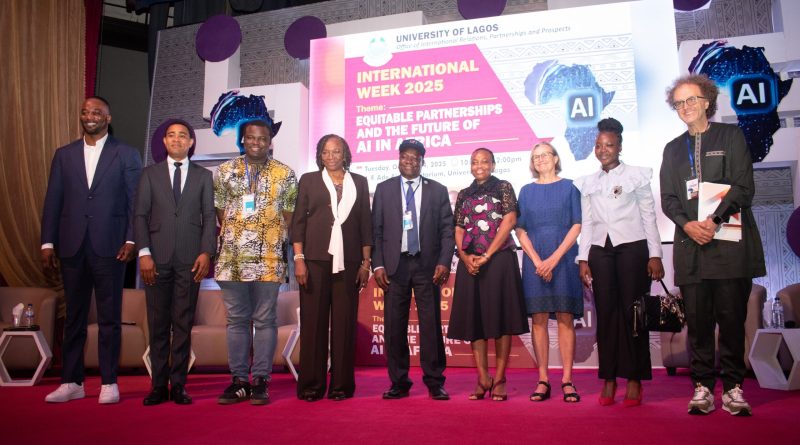UNILAG partners OpenAI to launch Africa’s first AI Academy
The University of Lagos (UNILAG) is set to make history as the first African institution to launch an OpenAI Academy, following a new partnership with the global artificial intelligence research and development company, OpenAI.
The announcement was made on Tuesday by Emmanuel Lubanzadio, OpenAI’s Africa Lead, during his keynote address at the opening ceremony of the university’s 2025 International Week, themed “Equitable Partnerships and the Future of AI in Africa.”
The academy, which will be officially unveiled on Wednesday, will provide free AI learning resources and capacity-building opportunities for students, researchers, and professionals across Africa.
Mr Lubanzadio described the partnership as a major step towards democratising access to AI knowledge and ensuring Africa plays an active role in shaping the technology’s future.
“The OpenAI Academy can be accessed by everyone globally. It provides free courses on how governments, scholars and individuals can use AI tools like ChatGPT effectively,” he said.
“Our collaboration with the University of Lagos will establish the first OpenAI Academy in Africa, beginning this week, with sessions led by facilitators who will showcase how AI is being used across Nigeria and the continent.”
He noted that the decision to begin the academy in Lagos was driven by UNILAG’s track record in innovation and its growing role in advancing technology-driven education.

Calls for equitable partnerships
In her welcome address, the Vice-Chancellor, Folasade Ogunsola, said this year’s international week goes beyond discussions on technology; it is about shaping the “narrative of inclusion, innovation, and global equity in the age of artificial intelligence.”
“Artificial intelligence is not the future; it is the present,” Mrs Ogunsola said.
The professor said AI represents an opportunity for Africa to “leapfrog limitations” and reimagine education, healthcare, governance and industry.
“But for AI to truly serve Africa, it must be built on equitable partnerships — rooted not in charity, but in shared growth and co-creation,” she said.
Mrs Ogunsola highlighted the university’s commitment to making AI research and innovation contextually relevant to African realities.
She referenced the university’s innovation challenge and international collaborations that have produced AI tools designed for communities with unreliable internet and power supply.
She added that UNILAG’s participation in global research networks positions it as a hub for interdisciplinary AI research, while ongoing collaborations have attracted over $28 million in research funding to the university.
Federal government backs AI inclusion
Representing the Minister of Communications, Innovation and Digital Economy, Bosun Tijani, the National Director of the National Centre for Artificial Intelligence and Robotics (NCAIR), Olubunmi Ajala, commended UNILAG for convening the programme.
Mr Tijani said Nigeria government is pursuing an ambitious digital transformation agenda aimed at positioning the country as a leader in AI and digital innovation.
He highlighted initiatives such as the National AI Strategy, launched in April 2024, and the three Million Technical Talent (3MTT) programme, designed to train young Nigerians in software development, data science, and machine learning.
“Our national AI strategy remains one of the most inclusive and human-centred in the world,” he said.
“Through strategic partnerships, we have mobilised billions in support from MTN, Google, Microsoft, and other partners. This is partnership in action, government providing the framework, private sector bringing resources, and young Nigerians driving innovation.”
He also pointed to Nigeria’s recently launched government-backed multimodal language model, describing it as the first of its kind on the continent.
Private sector push
Also speaking at the event, Yvonne Ike, Managing Director and Head of Sub-Saharan Africa (Ex-RSA) at Bank of America, urged students and young innovators to embrace bold thinking and collaboration in using technology to solve Africa’s most pressing challenges.
Ms Ike applauded the OpenAI-UNILAG partnership as a signal that African institutions are ready to take the lead in technological advancement.
“I’m not surprised that the first OpenAI Academy in Africa is starting with UNILAG,” she said. “We must accelerate and elevate every dream and action we have for Africa. Technology is not only in it for Africa, it is Africa’s opportunity to redefine its place in the world.”
She also challenged African institutions to move faster in preparing young people for a rapidly changing world.
“I urge us to accelerate, expand, and elevate every dream we have for Africa. We cannot wait for others to define our digital destiny,” she said.
Celebrating innovation
The event also featured an award presentation to winners of the university’s Innovation Challenge, comprising student groups whose AI-driven projects addressed challenges in health, energy, and community development.
Mrs Ogunsola said the competition highlighted UNILAG’s commitment to nurturing problem-solvers and innovators capable of building technologies.
She said: “When 339 students from 24 universities participated in our health innovation challenge earlier this year, competing for millions in funding, I sat in on some of their presentations.
READ ALSO: ANALYSIS: Journalism, writing, research are not victims of AI. They are its power core
“One team developed an AI diagnostic tool that works with poor internet connectivity. Another created a machine learning model for maternal health that functions in rural clinics with irregular power supply. These aren’t adaptations of Western technology – these are innovations that the West needs to study.”
The event also featured a panel session featuring speakers from the African Cities Research Consortium (ACRC), the University of Manchester (UK), and other institutions.
The UNILAG International Week, coordinated by the university’s Director of International Relations, Partnerships and Prospects, Ismail Ibraheem, a professor, continues through Thursday with workshops, exhibitions, and training sessions under the OpenAI Academy.

